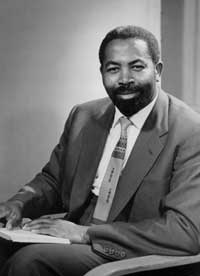Biography
by Bruce Eder
 Edric Connor is primarily remembered by filmgoers as an actor for his work on screen during the last 15 years of his life, but the Trinidad-born singer also played a pivotal role in the introduction of what is now called world music to England during the late '40s and early '50s. Born in Mayaro, Trinidad, in the British West Indies in 1913, he began singing as a young man and left Trinidad in 1944 for England, in search of wider success as both a musician and actor.
Edric Connor is primarily remembered by filmgoers as an actor for his work on screen during the last 15 years of his life, but the Trinidad-born singer also played a pivotal role in the introduction of what is now called world music to England during the late '40s and early '50s. Born in Mayaro, Trinidad, in the British West Indies in 1913, he began singing as a young man and left Trinidad in 1944 for England, in search of wider success as both a musician and actor.
Over the ensuing half decade, he became one of the leading exponents of West Indian music in England, in an era in which American jazz barely had a foothold. His performance with a steel band at the 1951 Festival of Britain in London was a major event in the musical life of postwar England, bringing exposure to a form of music that was beloved in a key part of the empire, and also planting a seed in the spread of Jamaican music that ultimately led to the boom in ska and reggae.
Edric Connor and his wife, Pearl, became major stars in music and acting over the ensuing decade, Connor becoming the first black actor to work with the Royal Shakespeare Company and playing key roles in a dozen major British and international films. In 1952, teamed with a singing group, he released Songs from Jamaica, a groundbreaking LP of Jamaican folk music credited to Edric Connor & the Caribbeans, on the Argo label. Acting came to dominate Connor's career during his final decade, in which he worked in several major epic movies and some prominent British television shows. http://www.allmusic.com/artist/edric-connor-p636179/biography
From the New York Times
About This Person
From All Movie Guide: Edric Connor was one of the more prominent black actors in England from the early '50s until his death in 1968. Born in Mayaro, Trinidad, in the British West Indies in 1913, he began singing as a young man and left Trinidad in 1944 for England, where he established himself as a musician and pursued an acting career. In 1951, he played a role in Zoltan Korda's groundbreaking drama Cry, The Beloved Country. The following year, he released his first full-length LP, {^Songs From Jamaica} by Edric Connor & The Caribbeans, for the Argo label. In 1953, he served as the African music advisor on George More O'Ferrall's The Heart of the Matter, based on the novel by Graham Greene. Connor appeared in the London play {+Summer Song}, later performed with the Royal Shakespeare Company, and became a regular performer in film beginning in 1954, starring in Harry Watt's West of Zanzibar. He was one of several players who excelled in John Huston's production of Moby Dick (1956), playing Dagoo, the West Indian harpooner, and he had a leading role in Fire Down Below(1957), a major international production starring Rita Hayworth and Robert Mitchum. Huston used him again in the 20th Century Fox production of The Roots of Heaven (1958) and Richard Fleischer cast Connor in The Vikings the same year. The actor briefly turned to directing in 1960 with the film Carnival Fantastique. During the '60s, in addition to working in such high-profile pictures as King of Kings (1961) -- in which he gave a very touching portrayal of Balthazar -- Connor moved into television, playing leading guest-star roles on such series as Danger Man. He appeared in the final episode of the original half-hour series, and worked in a first-season show from the hour-long series, in addition to an amazing Avengers episode entitled "The Gilded Cage," in which he played the operational leader of a gang of top-level criminals and stole almost every scene in which he appeared. Connor worked in one Hollywood movie, Robert Aldrich's Four for Texas (1963), but most of his career was in England, where he worked in two more films: Only When I Larf and Nobody Runs Forever (both 1968). He died in the fall of that year of complications from a stroke. ~ Bruce Eder, Rovi
Edric Connor is also the father of the late Dr. Geraldine Connor, who arranged for London's Ebony Steelband, giving them their first Panorama victory. Dr. Connor was also the first woman to play bass with Invaders Steel Orchestra in Trinidad in 1977.

Replies
Thank you for this bio. This means a lot to my Mayaro young generation family members.
Brenda H.
A lot of very important history here Brenda.